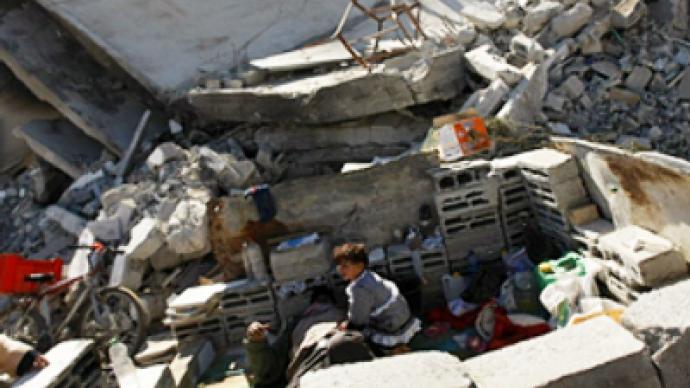Will UN action on Gaza “war crimes” derail peace process?

Despite a diplomatic blitz by Israel to block passage of the Goldstone report, which accuses Israel and Palestinians of war crimes in the Gaza War, the UN on Friday voted to back the recommendations.
The UN Human Rights Council (UNHRC) passed the resolution 25-6, as the United States and five European countries voted against.
The report demands reliable inquiries by Israel and Hamas into charges of war crimes and possible against humanity during Operation Cast Lead, the 22-day conflict that ended in a ceasefire in January yet continues to arouse passionate global scrutiny.
The report now moves to the UN General Assembly and the Security Council where the Israelis and Palestinians will be given six months to investigate the war crime charges. In the event of non-compliance, both sides risk an international war-crimes tribunal by the International Criminal Court in the Hague to prosecute militants.
Human rights groups say that more than 1,400 Gazans were killed in the conflict, but Israel officials put the number at 1,166. Thirteen Israelis were killed in the conflict, which Israel said was an act of self defense against rocket launches from Gaza into Israeli territory.
What next for the peace process?
At the beginning of the month, Israeli President Benjamin Netanyahu warned the UN that endorsement of the Goldstone report would “strike a fatal blow to the peace process… because Israel will no longer be able to take additional steps and take risks for peace if its right to self-defense is denied.”
Israel also accuses the Palestinians of employing “civilian shields” to cover their attacks, which works to propagate “anti-Israel propaganda sentiment” in the media.
Netanyahu said accepting the report would “strike a severe blow to the war against terrorism since it will afford total legitimization to terrorists who fire upon civilians and who hide behind civilians.”
(Incidentally, the Israeli president’s stern words may have been responsible for PA President Mahmoud Abbas voting for a UN deferral on the issue. But news of the retreat did not go down well on the Palestinian street, which erupted in protests and demands for Abbas's resignation. The public outcry forced the Palestinian government to throw their “full support” behind the discussions).
Others, however, argue that the Israeli military used “disproportionate force” during the conflict.
Former U.S. President Jimmy Carter, who paid a visit to Gaza in June, told reporters he had to “hold back tears” while viewing the destruction.
Visiting the American School in Gaza, severely damaged during Israel’s military offensive, Carter said “it’s very distressing to me,” explaining that the facility had been “deliberately destroyed by bombs from F-16s made in my country and delivered to the Israelis.”
What next for U.S.-Israeli relations?
Although Israel and Washington remain strong allies, the relationship has noticeably chilled since the arrival of Barack Obama.
In May, Netanyahu paid a visit to the White House where he and Obama attempted to close the circle on the Middle East tangle.
The U.S. President, echoing past administrations, stressed the need for a “two-state solution” to the Palestinian crisis, as well as a halt to settlement construction in the West Bank.
The government of Benjamin Netanyahu has all but excluded the possibility of an autonomous Palestinian state. While the hawkish Israeli President yielded to American pressure to support the creation of a Palestinian state, his conditions – that it must be demilitarized and recognize Israel as a Jewish state – may be asking for too much.
Now, with international pressure in the form of a possible war crimes tribunal looming for both Israel and Palestine, it will be interesting to see what course the road map for peace takes.
Beyond the pale of war
One reason for Israel's opposition to the Goldstone report is that it touches upon subjects not directly related to the Gaza conflict.
It "strongly condemns" actions taken by Israel that place limitations on Palestinians' access to their property and religious sites "on the basis of national origin, religion, sex, age or any other discriminatory ground."
It further condemns "Israeli violations of human rights in Occupied East Jerusalem, particularly the confiscation of lands and properties, the demolishing of houses and private properties, the construction and expansion of settlements, the continuous construction of the separation wall, changing the demographic and geographic character of East Jerusalem, the restrictions on the freedom of movement of the Palestinian citizens of East Jerusalem, as well as the continuous digging and excavation works in and around Al-Aqsa mosque and its vicinity."
Although this shopping list of grievances are not immediately connected to the question of war crimes in the Gaza conflict, they are a source of extreme antagonism between the two sides that demand attention.
Now it seems the UN wants to see serious action taken on these hot-button issues so that a desperately needed solution to the Middle East crisis can finally become a reality.












